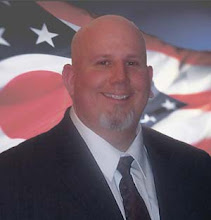Undoubtedly, a lot of prominent politicians (Democrats in particular) have been getting an eyeful of this inspiring logo, namely Connecticut Senator Christopher “Let’s Make A Mortgage Deal” Dodd, North Dakota Senator Byron Dorgan, and Colorado Governor Bill Ritter. That’s not including Senate appointees Roland Burris (Illinois) and Ted Kaufman (Delaware) – although in fairness these two announced very early on they would not seek reelection.
But, Dodd’s announcement is the real bombshell. Regarded as one of America’s most influential senators, his so-called retirement most certainly will create a significant power void among congressional Democrats.
Still, it’s not that surprising as Dodd had been one of many politicians who appeared would be swept-away by the massive wave of displeasure with incumbents everywhere. His choice to step aside is reportedly opening the door for Connecticut Attorney General Richard Blumenthal to make a viable run to be the next Democratic senator from that state. For those who are faithful viewers like me of the Glenn Beck program, you may remember Blumenthal from the shredding he endured at Beck’s hands last spring over his short-lived attempt to prosecute AIG executives for the crime of receiving bonuses.
In addition, speculation is rampant regarding other incumbent senators and representatives and their chances of retaining their seats. A bit more specifically, those commonly considered most vulnerable are the ones expected to vote “yes” on the proposed so-called health care reform and Cap and
Now knowing how politicians traditionally operate, when you consider how enormously unpopular the current health care reform package is the obvious question one would ask is, “Why would any politician who values their career in elected office vote for this legislation and other similar bills that the public has clearly and vocally rejected?”
During former President Bill Clinton’s first term in office, as the polling numbers began to circulate how unpopular his administration’s health care agenda was at that time the original proponents couldn’t abandon ship fast enough in order to preserve their own political futures.
The difference this time around is what I call “The Van Jones Effect.”
More commonly referred-to as President Barack Obama’s “Green Jobs Czar” by conservative commentators, Jones held the title of Special Advisor for Green Jobs, Enterprise and Innovation at the White House Counsel on Environmental Quality during his brief tenure with the current administration.
Despite repeated calls by Beck (and eventually others) for an explanation why the White House would appoint someone as a special advisor to the President who had publicly described himself as a communist and political radical, it wasn’t until after revelations that Jones was a 9-11 truther that he finally resigned. Quite curiously, Jones’ resignation was announced shortly after midnight on September 5 (the Sunday of Labor Day Weekend).
However by the time most folks were back to work following Labor Day, it was announced Jones had already accepted a position with the Center for American Progress, a Progressive Liberal think tank run by former White House Chief of Staff John Podesta and heavily funded by billionaire George Soros.
During the first attempt to nationalize health care in America 16 years ago, Soros had not yet become the omnipresent left-wing bankroller he is today. It is his deep-pockets methodology toward politics that has emboldened many Democrats to advance widely unpopular legislation – no matter how inevitably this agenda jeopardizes their future chances of election.
Basically, those who toe the progressive liberal line most faithfully have been enabled to adopt a “No Worries” mindset. And why should they worry? After witnessing Jones’ fate, many of Congress’ liberals can sit back in near-perfect comfort and ram-charge any insanely socialist measure they want: if they get voted out for it they know there will be a cushy, well-paying job waiting for them at either Center for American Progress, Moveon.org, the Apollo Alliance, or any number of other Soros-funded groups.
Isn’t the marriage of Washington and corporate fat cats a beautiful thing to behold?
To me the sad part of this scenario is regardless of how irresponsibly members of Congress vote between now and November, those who choose not to run again have created an easy path for their respective parties’ candidates to side-step the anti-incumbent movement. As in the case of Blumenthal, should he emerge as the Democratic candidate for senator in Connecticut he will enjoy the luxury of being able to sell to voters the notion, “I’m not the incumbent so it’s really not fair to hold me up against Christopher Dodd.”
In other words: in Connecticut, North Dakota, Illinois, Delaware, and various other states and districts we will be seeing a new round of “Change you can believe in.” Only this time it will be packaged differently – possibly creatively – depending on where it needs to be marketed.
Our hopes for the future as it relates to the upcoming elections rely heavily on one principle: don’t believe the hype!

No comments:
Post a Comment